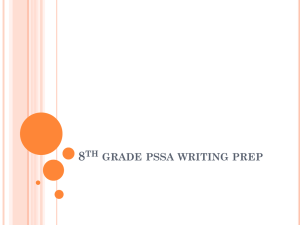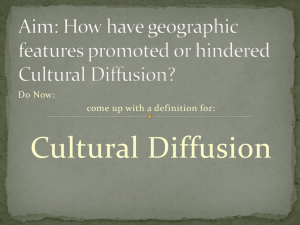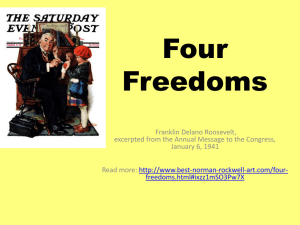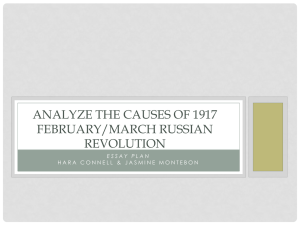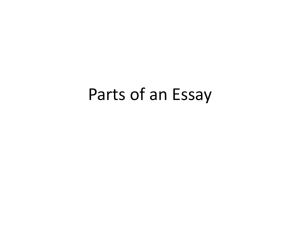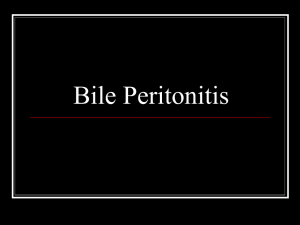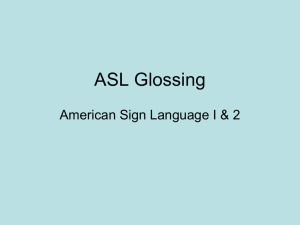Chapter 5 Bumps and Personalities
advertisement
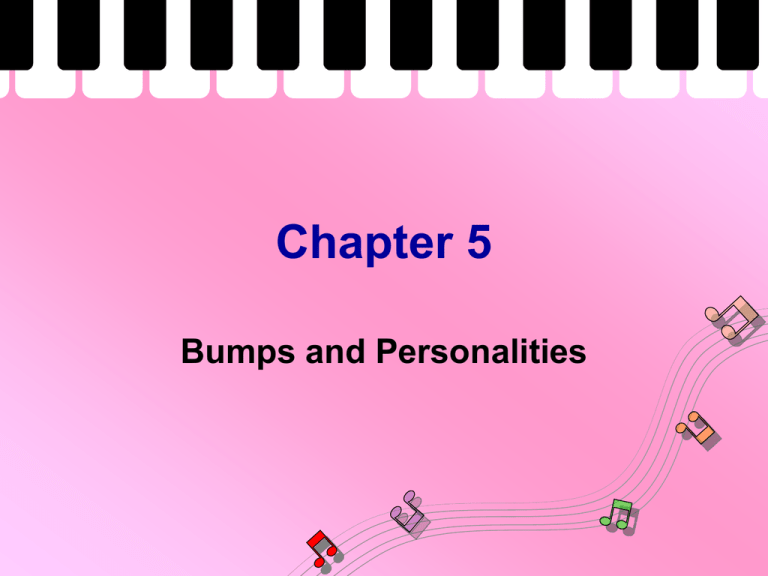
Chapter 5 Bumps and Personalities Reading Warm up • Look at the picture on p. 51. • tai chi What is the person doing? ________ • How can the practice help people? 1. Boost the immune system 2. Decrease anxiety and depression 3. Reduce asthma and allergy problems Pre-reading Activity p. 52 • Discuss these questions. 1. What do the eyes of the person in the picture tell you? 2. How does the shape of a person’s face tell you about the person? 3. Do people have different shaped heads? What does a person’s head shape tell you about the person? Predicting p. 52 1. Which parts of the head and face do you associate with each of the following characteristics? 1. _____ nose a. curiosity 2. _____ lips 3. _____ eyes b. self-confidence c. decisiveness 4. _____ shape of face d. creativity 5. _____ eyebrows e. pride 2. Read through the passage from p. 53 to p. 54 to find out the answer. (2 minutes) 3. Compare your answers with your partners. 4. Check your answers. 1. _____ a nose a. curiosity 2. _____ e lips 3. _____ d eyes b. self-confidence c. decisiveness 4. _____ b shape of face d. creativity 5. _____ c eyebrows e. pride Reading Activity pp. 53-54 • Work as a group. • Task 1: Read p. 53, paragraphs 2-3 • Task 2: Read p. 53, last paragraph ~ p. 54, 1st paragraph • Prepare to answer the teacher’s questions. • Task 1: a. Draw a person’s face (front or side view). b. Add some parts, such as a pointed nose, to the face. c. Explain what kind of personality a person with the physical feature, such as pointed nose, may have. (Refer to p. 53) • Task 2: a. Draw a human head (side view) with 40 bumps. b. Color the bumps mentioned in the reading text (pp.53-54). c. Explain the relationship between the bumps and a person’s talents or character. Compare your picture with the one on page59. Vocabulary p. 54 • Meaning 1. What are the meanings of the underlined words? Circle the letter of each correct answer. 2. Compare your answers with your partners. Answer 1. a 7. a 2. a 8. d 3. b 9. b 4. b 5. c Vocabulary pp. 55-56 • Word Building Complete the sentences with the correct form of the word in capital letters. v. 1. DECIDE a. A person who can choose quickly and doesn’t change his or her mind is _________. adj. decisive b. Arched eyebrows are said to indicate someone who can make _________. n. decisions 2. COURAGE n. courageous adj. a. A person who is brave is also _________. b. A bum behind your ear is said to be a sign of _________. courage n. n. 3. SCIENCE a. Many _________ thought Dr. Gall’s scientists n. research was ridiculous. scientific adj. b. It was difficult to find _________ proof for Dr. Gall’s theories. Comprehension • pp. 56-58 Looking for the Main Ideas 1. Physiognomists believe that ________. c. physical features reveal personality 2. Phrenologists ________. d. study bumps on the head to determine character traits 3. Dr. Gall’s ideas ________. a. were at first not accepted by other doctors • Looking for Details 1. Physiognomy is aanmodern ancient practice. F 2. The ancient Greeks compared the human face to those of animals. T 3. Phrenologists have identified 25 40 bumps on the head. F 4. A bump on the forehead is a sign of courage. good memory F F 5. Physiognomists study the shape of the head, face, and body. X T 6. Physiognomists believe that round-faced people are self-confident. 7. Phrenology is a much more ancient art than less F physiognomy. 8. Dr. Gall’s research did interested not interest many people. F 9. F Dr. Gall was rewarded for his research after in he life. died later • Making Inferences & Drawing Conclusions 1. Why did the Greeks compare humans to animals? They wanted to understand human behavior better. 2. Why did Dr. Gall want to study phrenology? He was looking for a scientific way of explaining personality. 3. Why did other doctors ridicule Dr. Gall’s research? They didn’t believe his theory. 4. Why did Dr. Gall die a poor and bitter man? Other doctors ridiculed him and he couldn’t get a good job. 5. What might a physiognomist say about someone with a long nose, thin eyebrows, and almond-shaped eyes? A pysiognomist might say that the person is not practical and does not think clearly, because those physical characteristics indicate curiosity, indecisiveness, and an artistic nature. Writing Model Essay pp. 61-62 • Read the essay written by a student. • Underline the thesis statement and the topic sentence in each of the body paragraph. • Discuss how the student write the conclusion. • Compare your answers. Answer Thesis statement: I was born under the sign Virgo and I believe I have some of the characteristics of people born under this sign. Topic sentence: 1st body paragraph One example of a good trait of a Virgo that I have is patience 2nd body paragraph Another example of a trait that I have, which is typical of a Virgo, is ambition. 3rd body paragraph Finally, like anyone, Virgos have some bad traits, too. Conclusion: (1) Summary of the main points My patience and ambition gave me the confidence…. (2) A final comment Because I…, I think I will someday be very successful…. Organizing • pp. 63-64 In an example essay…. 1. Each paragraph gives an example to support the thesis statement. Student Essay (pp.61-62): thesis statement I was born under the sign Virgo and I believe I have some of the characteristics of people born under this sign. Find more transitions from your textbook! 2. To give examples, transitions are used at the beginning of each of the body paragraphs. 1st body paragraph noun One example of [a good trait of a phrase Virgo that I have] is patience 2nd body paragraph noun phrase Another example of [a trait that I have, which is typical of a Virgo,] is ambition. 3rd body paragraph Finally, like anyone, Virgos have some bad traits, too. • If your last example is the most important: The most important example of noun phrase The most significant / interesting example of is noun phrase is.. 3.1 In the body paragraphs, you may use other specific examples to support your topic sentence. 1st body paragraph One example of a good trait of a Virgo that I have is patience. …I have also found that patience helps me in a lot of things. For example, …. 3.2 Use the following words and phrases to introduce examples in the body paragraphs: For example, it helps me to study when the lesson is difficult. complete sentence: S + V + O For instance, I like everything to be neat and tidy. I am very patient with people, too. For example, I am patient with children and senior. I am very patient with people, too,, for ,example, children and senior. instance, e.g., Exercise 1 • Possible answers 1. for example 2. For instance 3. for example Writing Assignment pp. 65-66 • Choose one topic. 1. Describe some of your good and / or bad traits. Give specific examples of these traits. Describe yourself according to the characteristics of your astrological sign. Describe a person you know or would like to know, using examples of two or three character traits. Describe the character of a famous person, using examples of his or her dominant character traits. 2. 3. 4. Procedures 1. Pre-writing Brainstorming techniques (p. 208) 2. Outlining a. Step 1: Write your thesis statement Step 2: Pick the best examples of strong character traits (from the brainstorming activity) Step 3: Begin each paragraph with a transition (p. 63) showing example. b. Essay outline (p. 22) 3. Write a rough draft 4. Revise your rough draft Your partner (peer editor) will use the checklist to help you revise your draft! 5. Edit your essay Your partner (peer editor) will help you correct your spelling, punctuation, vocabulary, and grammar (use editing symbols on p. 207). 6. Type your final draft and turn it in on July 23 / July 27 HW Assignments Class 1: July 16, Mon. • Review pp. 53-54: Check any new words • Preview pp. 63-64: Quiz on July 18. • Self-study 3: Chapter 14 Class 2: July 18, Wed. • Review pp. 53-54: Check any new words • Preview pp. 63-64: Quiz on July 23. • Self-study 3: Chapter 14 Class 1: July 18, Wed. 1. Self-study 3: Chapter 14 2. Vocabulary quiz (dictation & multiple choice): July 23 Chapter 5 & Self-study 3 3. Preview Chapter 11, pp. 137-138 4. Writing assignment: Outline due on July 23 Class 2: July 23, Mon. 1. Self-study 3: Chapter 14 2. Vocabulary quiz (dictation & multiple choice): July 25 Chapter 5 & Self-study 3 3. Preview Chapter 11, pp. 137-138 4. Writing assignment: Outline due on July 25

